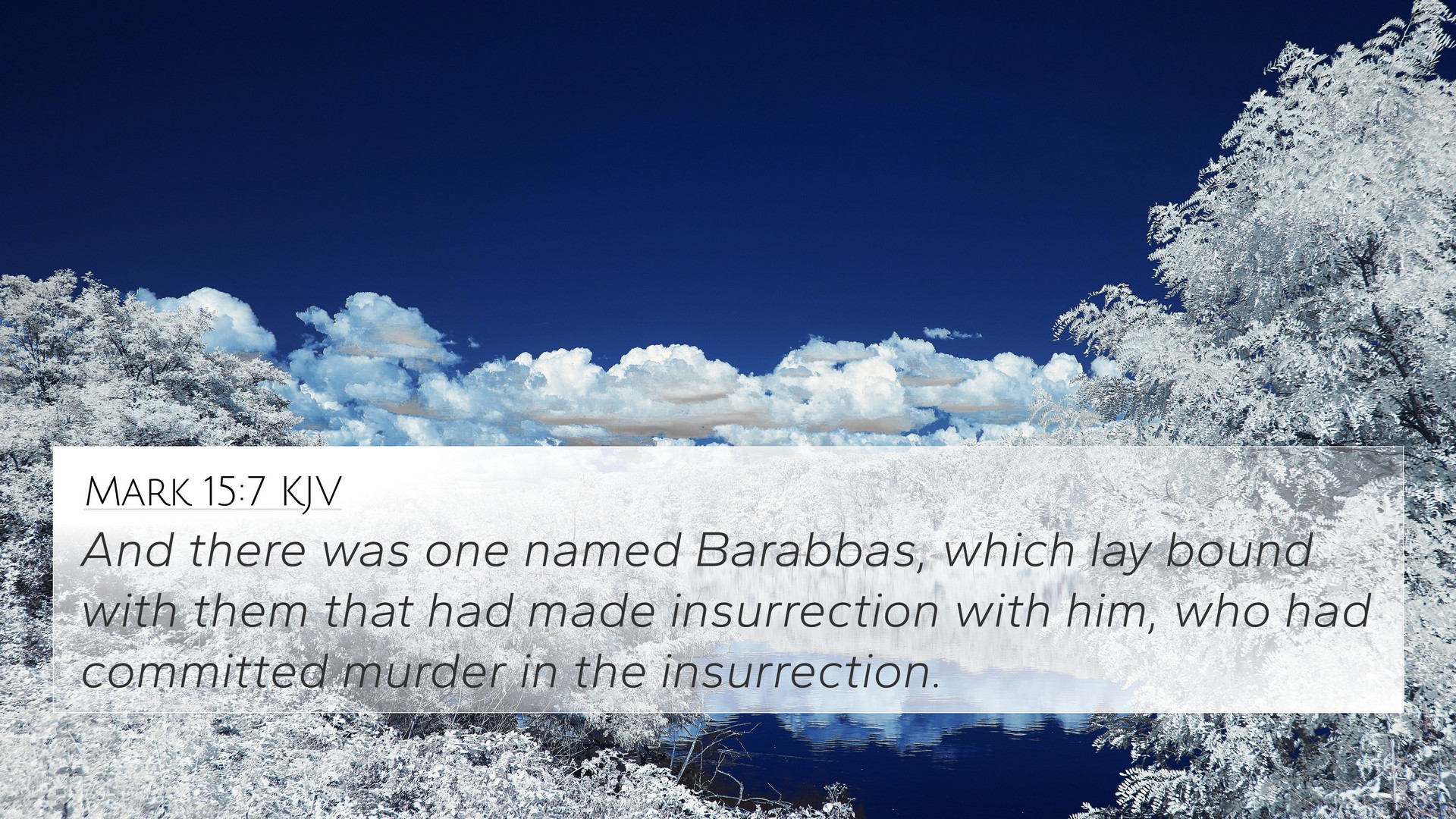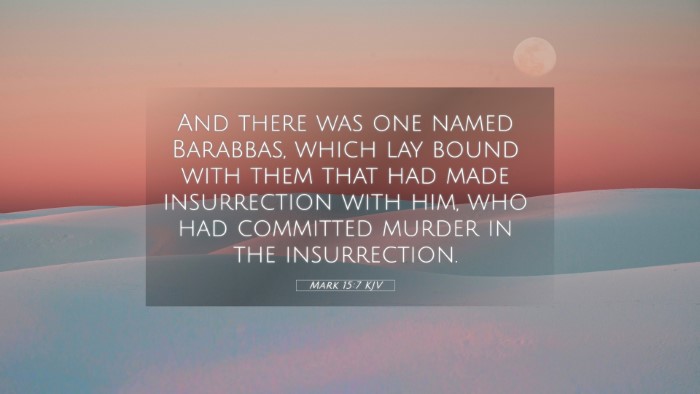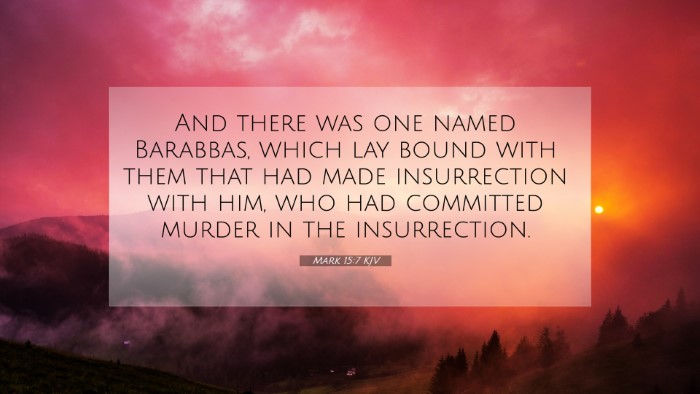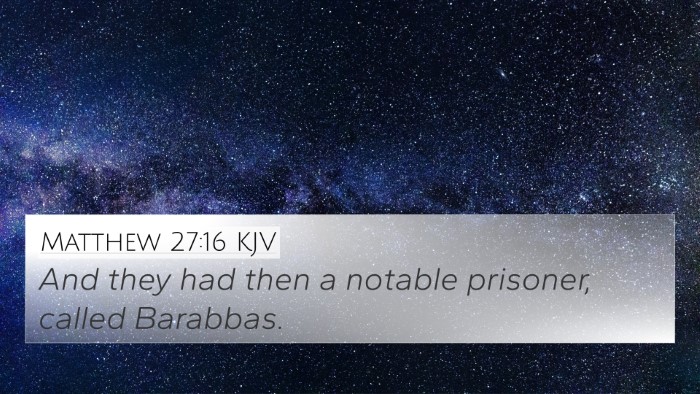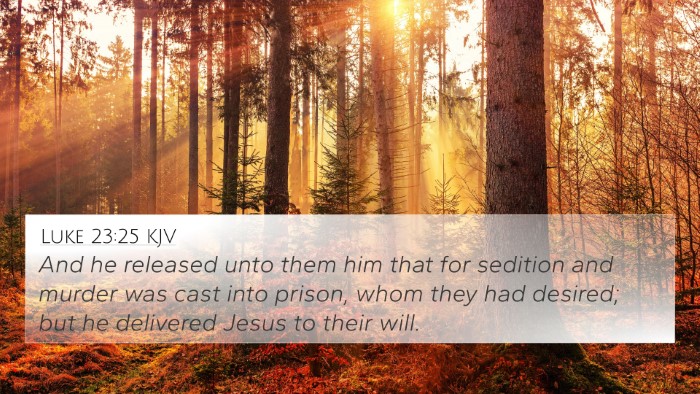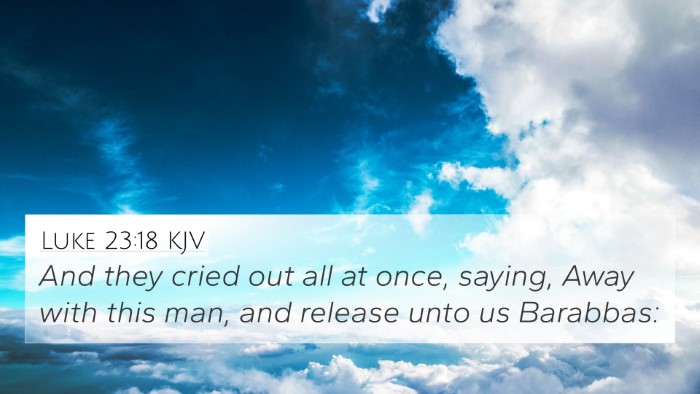Understanding Mark 15:7
Bible Verse: Mark 15:7
"And there was one named Barabbas, which lay bound with them that had made insurrection with him, who had committed murder in the insurrection."
Summary of Mark 15:7
This verse introduces Barabbas, a notable prisoner at the time of Jesus' trial. Mark highlights Barabbas as a figure guilty of severe crimes — insurrection and murder — illuminating the gravity of the choice that the crowd was about to make when they demanded the release of a prisoner during the Passover feast. The mention of Barabbas serves a dual purpose: it sets the stage for the dramatic exchange that occurs later and accentuates the mercy shown by Jesus through His ultimate sacrifice.
Commentary Insights
-
Matthew Henry explains that Barabbas represents the sinful human condition. His actions symbolize rebellion against authority, making his release juxtaposed with Jesus' condemnation all the more poignant. Barabbas' freedom illustrates the grace offered in exchange for the Savior’s sacrifice.
-
Albert Barnes interprets this moment as a profound example of the public's choice between Jesus, the embodiment of righteousness, and Barabbas, the embodiment of guilt. This contrast emphasizes the theme of substitutionary atonement, showcasing how Christ takes on the sins of humanity.
-
Adam Clarke focuses on the significance of Barabbas’ name, which means "son of the father," indicating a tragic play on words in opposition to Jesus, "the Son of God." This connection enriches the narrative's theological depth, accentuating the central Christian theme of sacrificial love.
Bible Cross-References
Mark 15:7 is connected to several other scripture passages, highlighting overarching themes of substitution, justice, and grace:
- Matthew 27:16-17 - Discusses the same incident involving Barabbas' release.
- John 18:40 - Mentions the crowd's choice between Jesus and Barabbas.
- Isaiah 53:5 - Foretells the suffering of the Messiah, linking to the sacrificial theme.
- Romans 5:8 - Illustrates God’s love in that Christ died for sinners, paralleling the choice presented in Mark 15:7.
- Luke 23:18-19 - Provides additional context on the crowd's rejection of Jesus in favor of Barabbas.
- Acts 3:14 - Highlights the choice made by the people to reject the Holy One, reinforcing the theme of misguided desires.
- 1 Peter 2:24 - Reflects on Jesus bearing our sins, paralleling the notion of Barabbas' guilt exchanged for Christ's righteousness.
Analysis of Thematic Connections
The narrative surrounding Mark 15:7 establishes significant connections between various Bible verses, illuminating important theological messages:
- Substitutionary Atonement: The role of Barabbas foreshadows the concept of Christ taking the place of sinners, an overarching theme in Christianity.
- Human Rejection of Divine Authority: The public’s choice signifies humanity’s recurring pattern of rejecting God’s will, reflected in numerous biblical accounts.
- Mercy and Grace: The release of Barabbas highlights the contrast between justice and mercy, a recurring motif throughout scriptures.
Comparative Bible Verse Analysis
When examining Mark 15:7 alongside other related texts, we can uncover deeper meanings and insights:
- The link between Barabbas’ release and the prophecy in Isaiah 53 shows fulfillment in the person of Christ.
- Matthew 27:22 explores Pilate's dilemma and strengthens the contrast of righteous versus unrighteous choice.
- Further connections can be drawn between Luke 18:10-14, comparing characters who demonstrate humility and repentance.
Tools for Bible Cross-Referencing
To engage fully with such passages and their interrelations, consider utilizing various resources:
- Bible Concordance: These tools help locate terms and references throughout the scripture, providing insight into thematic connections.
- Cross-Reference Bible Study Guides: These guides assist in studying how different passages relate to one another.
- Bible Chain References: Methodologies that allow readers to follow themes through various books of the Bible.
Inter-Biblical Dialogue
Mark 15:7 prompts a vital discussion about the parallel narratives in the Gospels. This dialogue enriches our understanding of Christ and his sacrificial role:
- How does Barabbas' story illuminate the salvation theme found in John 3:16?
- What can we learn about the nature of sin and redemption when comparing Romans 3:23 with Mark 15:7?
Conclusion
Mark 15:7 serves a pivotal role in the Passion narrative, encapsulating the choice of humanity against the backdrop of divine grace. As we explore cross-references and find connections between Biblical texts, we uncover a richer understanding of scriptural messages. This verse, with its profound implications regarding sin, mercy, and redemption, invites deeper reflection and study.
